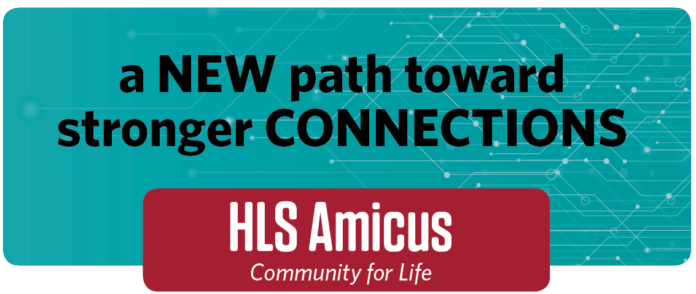Law schools operate in a competitive environment and continuously seek to innovate to maintain their competitive advantage, HLS being no exception. At a time when technology is becoming increasingly relevant to the law, HLS is embracing the use of technology to better connect students, professors, and alumni by introducing the Amicus Platform. The aim of Amicus is to empower students to get more from their law school experience and to build connections within the HLS community.
Launched in 2018, Amicus is intended to provide a space for current students, professors, and alumni to connect more purposefully. The platform is constantly updated to incorporate feedback on the community’s growing and changing needs. To this end, features are made available as students progress through law school, to ensure that the service remains relevant. Upon graduation, connections formed during law school are maintained. Amicus gives alumni the ability to stay connected with their former colleagues while also providing them the opportunity to mentor students.
In a recent interview with The Record, Jessica Soban, Associate Dean for Strategic Initiatives at HLS, outlined the goals for Amicus. Soban described the main idea driving the Amicus project as one that seeks to combine the features of various social media platforms we’re already familiar with. In a nutshell, Amicus combines the professional networking features of LinkedIn with the profile directory features of Facebook and the matching approach of Match.com to pair students and mentors. The hope is to build a tool that allows students and alumni to gain significantly more from their community and experience at HLS.
Amicus fills a much-needed niche for a “technology backbone to support the broader ecosystem of support networks,” Soban explained. For decades, the law school has provided traditional means of support, such as RAs, Board of Student Advisers, section leaders, and 1L reading groups. Amicus has taken these various support networks and centralized them so students can connect with specific individuals or student organizations within the HLS community, based on their personal needs.
Soban highlighted the mentorship feature as a particular strength of Amicus. Students can now reach out to and interact with practicing experts. In addition, student organizations that are already running their own mentorship programs can use the platform to support their efforts. Amicus will allow for peer advising and could change the way students interact with one another. Going beyond simply forming traditional study groups, students can leverage the platform to share advice on classes to take, areas of law to focus on, and organizations to get involved in.
Amicus also improves how law professors cater to their students’ needs. Professors can use the platform to conduct student surveys in their 1L sections to better learn about the various backgrounds and needs of their students. Faces can get lost in the lecture hall, but Soban hopes that Amicus will help professors and administrators better support their students. Students can also use Amicus to reach out to professors whose work aligns with their individual interests.
In the future, Amicus may help harness technology to reinvent the traditional 1L curriculum by building on 0L – HLS’s new pre-matriculation program. Incoming students would be able to access materials that can help them enter HLS prepared and confident, while allowing for more time in the classroom for discussion and supplemental materials.
So what does Amicus mean for the broader legal community? As HLS experiments with the use of technology to supplement the law school experience, other law schools will follow. Amicus demonstrates that technology is not reserved for STEM departments and can instead play a supporting role in law schools by creating a valuable virtual space for students to learn and build relationships that go beyond their three years at law school. Ultimately, technologies like Amicus can help law schools equip students for 21st century legal practice by providing a richer and personalized law school experience and building vibrant alumni communities.


